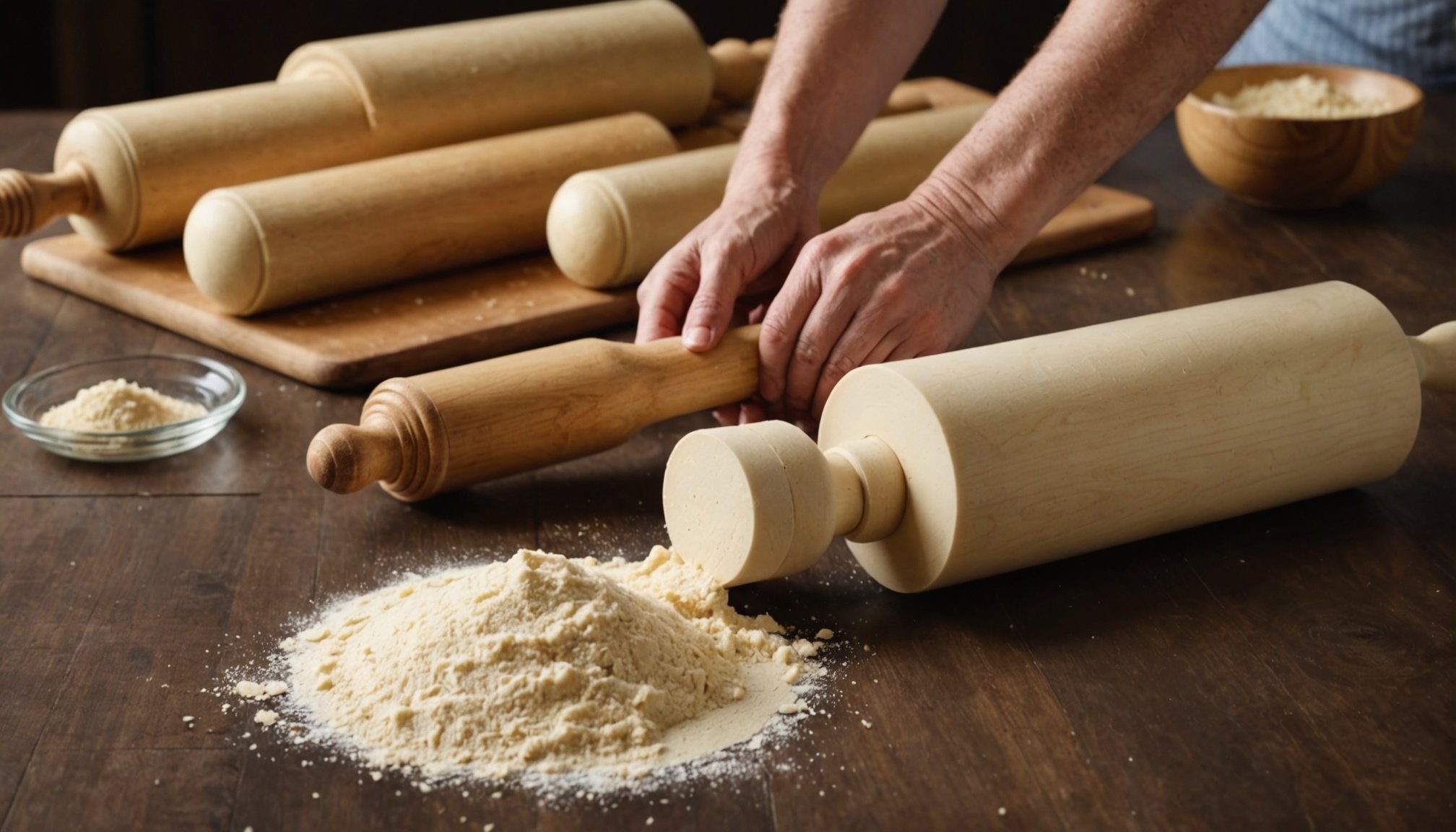Understanding Rolling Pins
Rolling pins are indispensable baking tools that come in various types, each suited for different tasks. The benefits of selecting the right rolling pin are numerous, assisting users in achieving precise results.
Overview of Different Rolling Pin Types
Common rolling pin types include tapered, straight, and handled designs. Tapered rolling pins, often preferred by pastry chefs, allow better control over dough, especially for pies and pastries. Straight rolling pins, also called dowel pins, are versatile and favored for an even thickness. Handled rolling pins, on the other hand, are user-friendly for beginners due to their ergonomic design.
Also to read : The Definitive Handbook for Choosing a Long-Lasting, Low-Maintenance Pull-Down Sprayer Kitchen Faucet
Benefits of Using the Right Rolling Pin
Using the correct rolling pin enhances your baking experience. For example, a tapered pin provides flexibility, allowing you to pivot and adjust pressure easily. This attribute suits tasks like laminating dough or rolling out pizza bases. Opting for the right tool can simplify tasks and improve the final baked product’s quality.
Role of Material in Rolling Pin Effectiveness
The material significantly influences a rolling pin’s effectiveness. Wooden rolling pins, often admired for their natural feel, require proper upkeep but manage dough’s stickiness well. Silicone offers non-stick advantages, while marble retains coolness, making it ideal for pastry work. Choosing a material that complements your baking style and preferences enhances performance and longevity.
Have you seen this : Boost Your Culinary Skills: Unveiling the Advantages of a Specialized Potato Storage Bin for Your Kitchen
User Reviews and Experiences
User reviews and experiences offer valuable insights into selecting the best baking tools, particularly when considering different rolling pin types. Many bakers emphasize the importance of wooden rolling pins, praising their natural feel and moderate weight, which lends stability during delicate tasks. On the contrary, some prefer silicone rolling pins for their non-stick advantages, especially when working with sticky dough.
In online baking communities, discussions often highlight how user preferences stem from specific baking needs. For instance, marble rolling pins are frequently recommended for pastry enthusiasts aiming to retain dough’s coolness. However, these reviews also caution regarding the heavier weight, which might be cumbersome for extended use.
Community tips also reveal creative ways brewers utilize these pins for non-traditional recipes, such as pasta making or even in crafting tasks. Usually, the versatility of the rolling pin types is a recurring theme, with users often experimenting to enhance their overall baking experience.
While real-world experiences vary greatly, most bakers agree that understanding your baking needs and experimenting with different types aids in finding a personal favourite. Engaging with reviews and shared experiences can guide you in making an informed decision, ensuring you invest in a tool aligned with your culinary undertakings.
FAQs about Rolling Pins
When it comes to selecting the perfect rolling pin, several common questions arise among baking enthusiasts. To achieve the best results in the kitchen, consider the following insights.
What type of rolling pin should I choose for pastry work? A marble rolling pin is ideal for pastry enthusiasts due to its ability to retain coolness, helping to maintain the dough’s consistency. This feature is crucial for preventing the dough from becoming too soft or sticky.
Are silicone rolling pins suitable for working with sticky dough? Absolutely. Silicone rolling pins possess non-stick advantages, which make them exceptionally well-suited for sticky doughs. Their non-stick surface reduces the likelihood of dough adhering, minimizing frustration during the rolling process.
Do wooden rolling pins require special care? Yes, wooden rolling pins need proper upkeep to ensure longevity. It’s advised to hand wash them and avoid submerging them in water. Regular oiling can also help maintain their quality and performance.
Baking tools like rolling pins play a vital role in the kitchen, and addressing these questions ensures bakers make informed decisions suited to their specific baking needs. Understanding these nuances aids in selecting the right baking tools, enhancing the quality and enjoyment of the baking process.
Choosing the Right Rolling Pin
Selecting the ideal rolling pin requires considering several factors to enhance your baking experience. Different baking needs demand specific rolling pin features, such as material, size, and weight.
Baking Needs and Material
For pastry enthusiasts, marble rolling pins are recommended due to their cool surface, which maintains dough consistency. However, they might be cumbersome for prolonged use. In contrast, wooden rolling pins offer a balanced weight and natural feel. These attributes make them well-suited for general use. Silicone rolling pins cater to non-stick requirements, ideal for sticky dough preparations. Exploring different rolling pin materials can lead to finding one that complements your culinary style.
Importance of Design
Handle design plays a crucial role in user-friendliness. Handled pins offer better grip and control, especially for beginners. Additionally, considering the pin’s length is essential as longer pins cover more dough surface, critical for larger baking tasks.
Recommendations
Novice bakers might prefer lightweight and handled rolling pins for effortless maneuvering. Experienced bakers might choose heavier, handle-less designs for greater precision. Tailoring your selection to your baking tasks and personal preferences ensures optimal performance and benefits your culinary creations.
Types of Rolling Pins
Understanding the right rolling pin types for specific tasks is crucial for enhancing your baking endeavors. Various options are available, each offering unique benefits.
Wooden Rolling Pins
Wooden rolling pins are prevalent due to their natural feel and balanced weight, enhancing control over dough. Their moderate weight provides stability, making them ideal as versatile baking tools. Despite needing regular oiling to maintain quality, users appreciate their durability and natural aesthetics. They are particularly favored for tasks requiring a delicate touch, such as pie crusts.
Silicone Rolling Pins
For those seeking non-stick abilities, silicone rolling pins are a perfect choice. These pins prevent dough from sticking, minimizing preparation time and frustration. Lightweight and easy to clean, silicone is favoured for sticky doughs like cookies or pastries, where adherence issues can be problematic. However, they might lack the heft needed for firmer doughs.
Marble Rolling Pins
Praised for their coolness, marble rolling pins are especially suited for delicate pastries where temperature control is vital. The cool surface maintains dough consistency, reducing softening risks. However, their heavier weight can be cumbersome for longer tasks, potentially tiring the user. Despite this, many pastry aficionados consider them essential for precise baking needs.
Care and Maintenance of Rolling Pins
Proper rolling pin care ensures longevity and enhances baking performance. Different materials demand tailored maintenance practices to maintain their quality and look.
Best Practices for Cleaning and Maintaining
Wooden rolling pins require careful handling. They should be hand-washed using mild soap and water, taking care to avoid soaking, which can lead to warping. Regular oiling with food-grade mineral oil prevents drying and cracking, preserving their smooth texture.
For silicone rolling pins, maintenance is considerably easier. They can be washed in the dishwasher or with warm soapy water, rinsed thoroughly to avoid residue buildup. Silicone’s non-stick surface simplifies cleaning, making it convenient for bakers.
Marble rolling pins need wiping with a damp cloth followed by a gentle drying to prevent water stains. They should never be submersed in water due to their porous nature, which could encourage stains.
Storage Tips to Prolong Life
Store rolling pins in a cool, dry place, either lying flat or standing upright, to prevent warping. Consider wrapping wooden and marble pins in a cloth to buffer against humidity changes.
Addressing Common Issues
To tackle dough sticking to wooden rolling pins, dust them lightly with flour before use, while silicone pins usually won’t require this step due to their inherent non-stick quality.
Rolling Pin Recipes
Incorporating rolling pin recipes into your baking routine can transform both the process and the outcome of your creations. Rolling pins are not just for flattening dough; they are crucial in achieving the desired baking ideas for various textures and thicknesses.
Dough for Cookies and Pastries
Rolling pins bring an even thickness to cookie and pastry dough, creating uniform results that bake evenly. When preparing cookie dough, use a silicone rolling pin to handle stickiness effectively, ensuring a smooth roll-out without tearing the dough. For pastry dough, the coolness of a marble rolling pin helps maintain consistency and prevents butter from melting too quickly, crucial for flaky results.
Bread Roll Recipes
Elevate bread rolls by achieving the perfect dough thickness. A wooden rolling pin provides optimal weight and control for bread dough, offering stability and even pressure. This enhances the dough’s elasticity and provides a fluffy finish once baked.
Specialty Doughs for Unique Baked Goods
Customized rolling pins, such as embossed or patterned varieties, enable bakers to step into creative territory with specialty doughs. These baking tools add decorative elements to festive cookies or themed pie crusts. The right rolling pin not only enhances aesthetics but also streamlines achieving your baking vision.





